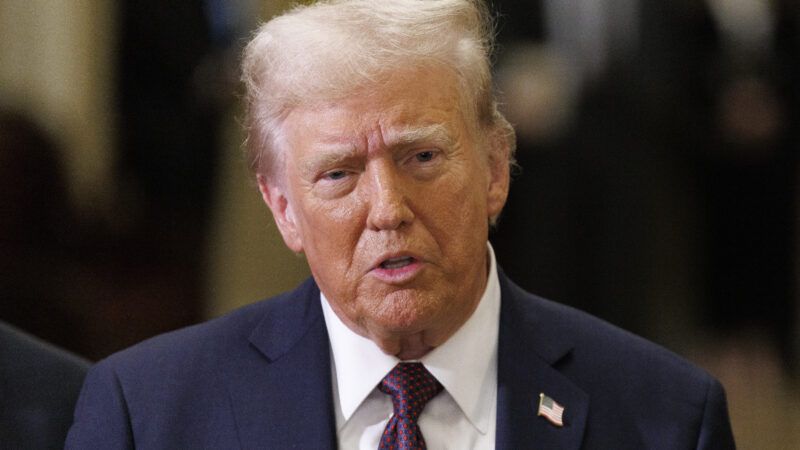Trump's Inauguration Won't Change the Fact That People Dislike High Gas Prices
The incoming administration is grappling with uncomfortable political consequences of the tariffs Trump wants to impose.

After a meeting with President-elect Donald Trump at Mar-a-Lago, Alberta Premier Danielle Smith told reporters that she does not expect Canadian goods to gain any special exemptions from the tariffs Trump plans to levy soon after taking office.
Smith had pitched Trump on exempting Alberta's crude oil exports from the 25 percent across-the-board tariffs that the incoming president has threatened to impose, the Edmonton Journal reported. Alas, Trump seems unmoved. "I haven't seen any indication in any of the president's public commentary or even in the comments that he had with me that he's inclined to change his approach," Smith told the paper.
On the American side of the border, it might be helpful for someone to game this out. More than 50 percent of the crude oil imported to the U.S.—the stuff that is used to make gasoline and other essential products—comes from Canada (and much of that total comes from Alberta, specifically).
A new tariff on that crude oil will be passed along to consumers down the supply chain. Among other things, that likely means higher prices at the pump. The specifics remain to be seen, but analysts believe prices could jump by 40 cents or even 70 cents per gallon. If those tariffs spiral into a broader trade war, energy companies are already warning about "volatility in crude oil prices, impacting refineries and downstream fuel markets, especially for gasoline and diesel."
Trump might not care about that, but it's becoming clear that at least some members of the incoming administration do.
Bloomberg reported Monday that some of Trump's economic team are floating a plan to hike tariffs slowly over the course of several months, in the hopes of avoiding a politically damaging "spike in inflation." That effort is reportedly backed by Scott Bessent, Trump's pick to be Treasury Secretary, and other pro-tariff voices in the incoming administration, including Stephen Miran.
But, wait a moment. Tariffs cause inflation? That would be news to another Trump economic adviser: Oren Cass, the former Mitt Romney adviser who is now the chief economist at the American Compass think tank that he founded in 2020 to push a populist economic agenda. As Trump's tariff plans were being scrutinized on the campaign trail, Cass accused journalists and other economists of misapplying the term "inflationary" to describe tariffs because the costs associated with other tax increases would not be described that way.
Technically, Cass has a point. Inflation causes the value of money to fall, so you have to spend more dollars to buy the same amount of goods. Tariffs, on the other hand, cause goods (like crude oil imported from Canada) to become more expensive. Your money is still worth the same amount, but you still have to spend more to buy the same thing—which is what happens when gas prices go up.
Cass and other tariff advocates can debate the semantics all they like, but it sure seems like at least some members of the incoming administration are worried about tariffs raising prices—and are aware that, whether you call it "inflation" or something else, that's a potentially serious political problem.
Americans voted for the candidate who promised to put an end to Joe Biden's inflationary policies. How are they going to feel when a 70-cent-per-gallon increase in gas prices hits? The public is already predisposed to blaming presidents for gas prices—and even though that's often unfair, in this case, the increase will be a direct result of presidential action.
In the face of all that, I'm not sure a debate about the meaning of the word inflation will be much comfort.
A much better solution? Stop worrying about how to spin this and put that energy toward policies that will make Americans richer, not poorer.


Show Comments (93)